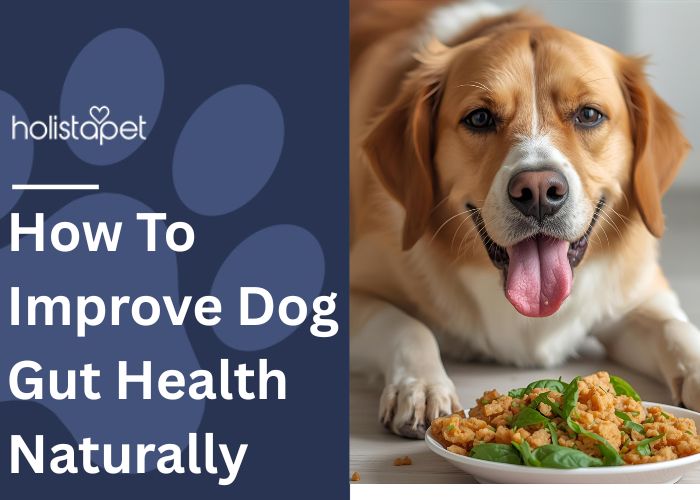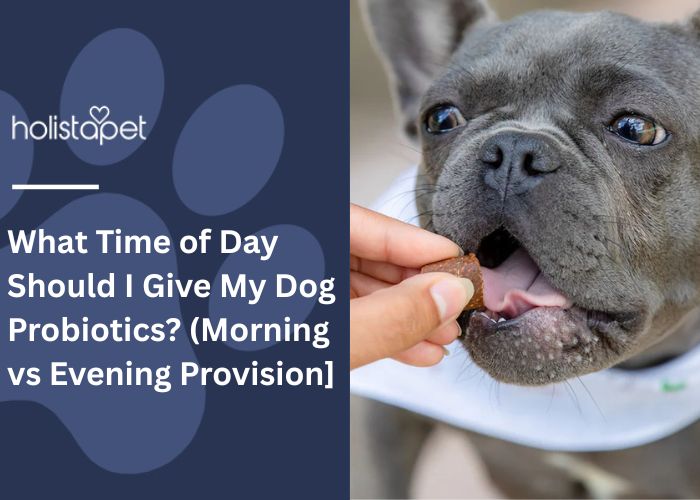A dog's gut runs the show more than we realize. And if you've wondered how to improve dog gut health, the answer starts with small daily choices.
A strong belly means better digestion, steady energy, and fewer tummy troubles. Feed it right, give it care, and you'll see your pup's spark come back fast.
Why Gut Health Is Important for Dogs

A dog's gut does more than handle food. With strong digestion, canine pets can absorb nutrients from their food, have fuel for play, and maintain steady energy. A balanced gut microbiome also blocks bad bacteria and promotes a stronger immune system. With good gut health, your furry friend can enjoy smoother digestion, fewer skin troubles, and better overall health.
Signs Your Dog May Have Poor Gut Health
A pup with an unhealthy gut often shows it in ways that seem unrelated to food. Spotting these signals early can help you improve their gut microbiome before issues get worse.
-
Digestive Problems
-
Skin Irritations and Allergic Reactions
-
Mood, Behavior, and Energy Changes
Digestive Problems
Tummy troubles are one of the clearest signs of poor gut health in dogs. Gas, diarrhea, and constipation often point to bacterial imbalance in the gut. These changes show that bad bacteria may be crowding out the beneficial microorganisms.
When your dog's gastrointestinal tract (GI tract) struggles, they can't absorb essential nutrients as well. That means less energy, more discomfort, and repeated stomach troubles that slow them down.
Skin Irritations and Allergic Reactions
Your dog's gut microbiome also affects how their skin looks and feels. An imbalanced system can trigger itching, rashes, or frequent breakouts. These problems may come from bad bacteria impacting nutrient absorption.
When the gut struggles, your dog's immune system can overreact, too. That reaction often shows up as skin irritation or allergic reactions, leaving your pooch uncomfortable and restless.
Mood, Behavior, and Energy Changes
The gut and brain stay closely linked. When the bacteria in your dog's microbiome fall out of balance, they may seem upset, restless, or low on energy. Some canines show anxious behaviors, while others appear tired more often.
Poor gut health can drain energy needed for play or walks. Restoring harmony in the gut often brings back a steady mood and brighter daily energy.
Common Causes of Gut Imbalances in Dogs

Gut problems often build up from everyday habits or outside factors. Knowing the common triggers helps pet owners prevent issues.
-
Poor-Quality or Processed Diets
-
Antibiotics and Overuse of Medications
-
Stress, Anxiety, and Environmental Triggers
Poor-Quality or Processed Diets
Your dog's diet has the biggest impact on their gut health. Processed meals or low-quality dog food can upset the GI tract and feed unhealthy bacteria. Over time, this weakens the gut microbiome and reduces healthy gut bacteria.
Without a proper diet, dogs struggle with digestion and nutrient absorption. A weak belly can lead to gut health issues that affect energy, skin, and overall well-being.
Antibiotics and Overuse of Medications
Antibiotics can save lives, but they also wipe out good bacteria along with harmful bacteria. Too much medication use may leave your dog's gut out of balance. This can weaken the digestive system and lower immune response.
When the gut loses its healthy bacteria, poor digestion and other health problems follow. Maintaining balance often requires food changes or gut health supplements to help rebuild the gut microbiome.
Stress, Anxiety, and Environmental Triggers
Dogs feel stress just like people, and it often shows up in their gut. Upset moods or sudden changes at home can disturb the digestive system. Anxious behaviors may even trigger discomfort in the gastrointestinal tract.
Loud noises, travel, or new routines add extra pressure on the gut. Over time, these triggers may cause poor gut health and a weaker immune system.
Natural Ways To Improve Dog Gut Health

Natural steps can bring the gut back into balance and keep digestion steady. A few simple changes in daily care can improve overall gut health and long-term well-being.
-
Feeding a High-Quality Whole-Food Diet
-
Using Probiotics and Prebiotics
-
Adding Fiber and Fresh Vegetables
-
Supporting Hydration and Clean Water
-
Regular Exercise and Outdoor Activity
Feeding a High-Quality Whole-Food Diet
A diet made with whole foods gives the gut the right fuel to thrive. Fresh meats, vegetables, and grains can improve nutrient absorption and promote healthy digestion. When a dog eats balanced meals, good bacteria multiply and harmful bacteria decrease. A strong digestive tract keeps them active, comfortable, and ready for play.
Using Probiotics and Prebiotics
Probiotics add live bacteria that help balance the gut. Prebiotics feed those healthy bacteria, making the gut microbiome stronger. Together, they support digestion, immunity, and overall well-being. Dog-specific probiotic supplements work best since they're made for the canine digestive system.
One great option is HolistaPet's Dog Probiotic Chews. These soft chews contain nine strains of beneficial bacteria, plus pumpkin and sweet potato for digestion. They help maintain regularity, ease stomach troubles, soothe irritated skin, and promote healthy gut bacteria. Each bag includes 30 tasty bites, safe for all breeds and sizes.
Adding Fiber and Fresh Vegetables
Fiber feeds healthy gut bacteria and keeps the digestive tract moving. Fresh vegetables like carrots, pumpkin, or green beans add dietary fiber that supports proper digestion. These foods also deliver essential nutrients that strengthen overall gut health. Dogs with more fiber in their diet often show fewer tummy issues.
Supporting Hydration and Clean Water
Clean, fresh water helps break down food and moves it smoothly through the digestive tract. Without enough hydration, digestion slows and discomfort may follow. Regular access to clean water also supports a balanced gut microbiome. It helps good bacteria thrive while keeping harmful bacteria from causing digestive problems.
Regular Exercise and Outdoor Activity
Daily walks or playtime help stimulate the digestive tract and support a healthy gut microbiome. Active dogs often show smoother digestion and stronger immune response. Outdoor activity also helps reduce upset moods that can harm gut balance. Fresh air, social time, and exercise together improve overall well-being and support your dog's gut health long-term.
How To Support Dog Gut Health Long-Term
Long-term gut health takes steady care, not quick fixes. A mix of preventive steps, stress management, and careful diet monitoring makes a winning combo.
-
Managing Stress Levels in Dogs
-
Monitoring for Food Sensitivities and Allergies
Regular Vet Checkups and Preventive Care
Routine vet visits and preventive care help catch gut health issues before they grow worse. A veterinarian can check your dog's digestive system, gut bacteria, and overall well-being. These visits also give you a chance to ask about dietary changes or probiotic supplements. Early action means fewer digestive issues and better long-term health for your pup.
Managing Stress Levels in Dogs
Stress can upset the gut and lead to digestive issues. Daily exercise, social play, and attention from you help ease worried or negative thoughts. A calm routine often supports better gut and immune health.
Many pet owners also turn to CBD (cannabidiol) for natural calming support. The good news is that HolistaPet offers quality chews, treats, oils, and capsules made with broad-spectrum CBD for soothing relief. These options are all-natural, vegan-friendly, non-GMO, lab-tested, and vet-approved.
Monitoring for Food Sensitivities and Allergies
Food sensitivities often hide behind gut health problems. Pets with an imbalanced gut may show itchy skin, stomach troubles, or other allergic reactions. Watching how your dog eats and reacts to certain foods can reveal important clues. Switching to a nutritious diet or specially formulated dog food may restore harmony.
FAQs – How To Improve Gut Health in Dogs
From diet changes to natural remedies, there are many ways to aid your dog's gut health. Here are some quick answers to common questions pet parents have.
Can you improve dog gut health without supplements?
Yes, you can improve your dog's gut health without supplements. Feeding a high-quality whole-food diet, adding fiber-rich vegetables, and keeping clean water available all help build a healthy gut microbiome. Exercise also supports digestion and immune health. While supplements like probiotics add benefits, natural habits alone can restore balance and improve your pup's overall digestive health.
Can you check a dog's gut health at home?
You can watch for early signs of gut problems at home. Loose stools, constipation, or frequent gas may point to trouble in the digestive tract. Skin irritation, rashes, or sudden mood changes can also signal an imbalanced gut microbiome. While you can spot patterns, though, a veterinarian still gives the clearest picture.
Can stress and anxiety cause gut problems in dogs?
Yes, stress can upset your dog's gut. Worried or negative thoughts often affect the digestive system and may trigger stomach troubles. Anxious behaviors can also weaken the gut microbiome, leading to more discomfort and poor digestion. Calming routines, exercise, and natural remedies like probiotics or CBD may help restore balance.
What natural foods are best for dogs' gut health?
Fresh, whole foods help build a healthy gut microbiome. Pumpkin, sweet potatoes, and carrots add fiber for smoother digestion. Fermented food like plain yogurt provides live bacteria that boost gut balance. Lean meats give protein for strength and proper nutrient absorption. Adding these foods in moderation can support a balanced gut and improve your dog's overall health.
How long does it take to restore gut health in dogs?
Restoring gut health takes time, and every dog is different. Some pups show improvement within a few weeks of dietary changes, probiotics, and better routines. For others, it may take several months. Patience and consistency matter most, as steady care helps rebuild healthy bacteria and improve your dog's digestive system over time.
Final Thoughts on How To Naturally Improve Dog Gut Health
A strong gut helps dogs stay active, absorb nutrients, and enjoy daily life without tummy troubles. Small changes like better food, probiotics, fiber, and clean water create lasting improvements. Consistent routines build a healthier gut microbiome and support overall well-being. For extra help, HolistaPet offers probiotic chews and CBD products designed to support internal balance.
Your pup's gut is the gateway to their health. Care for it, and you'll see their best self shine every single day.
Click the link to discover more Dog Care remedies!


 CBD Oil for Dogs - Fast Acting
CBD Oil for Dogs - Fast Acting
 Chicken Flavored CBD Oil For Dogs - Easy Dose
Chicken Flavored CBD Oil For Dogs - Easy Dose
 Salmon Flavored CBD Oil For Dogs - Highly Rated
Salmon Flavored CBD Oil For Dogs - Highly Rated
 CBG Oil for Dogs and Cats - Loved by Thousands
CBG Oil for Dogs and Cats - Loved by Thousands





Leave a comment
All comments are moderated before being published.
This site is protected by hCaptcha and the hCaptcha Privacy Policy and Terms of Service apply.